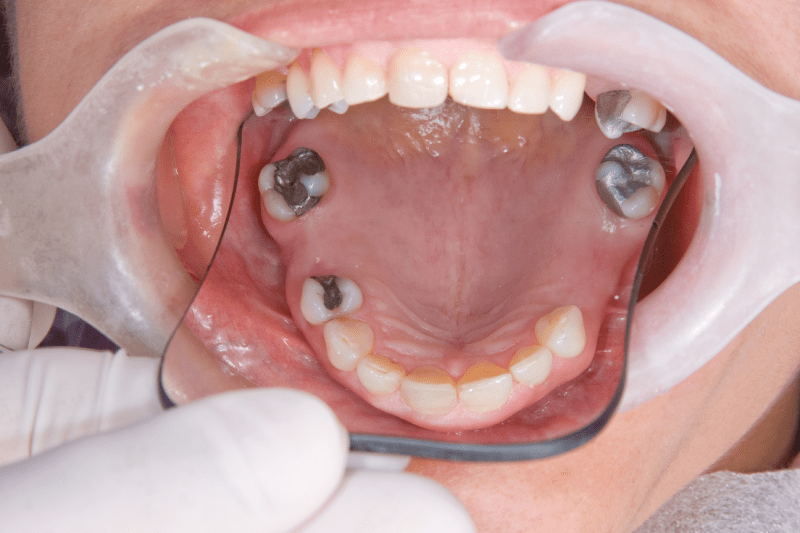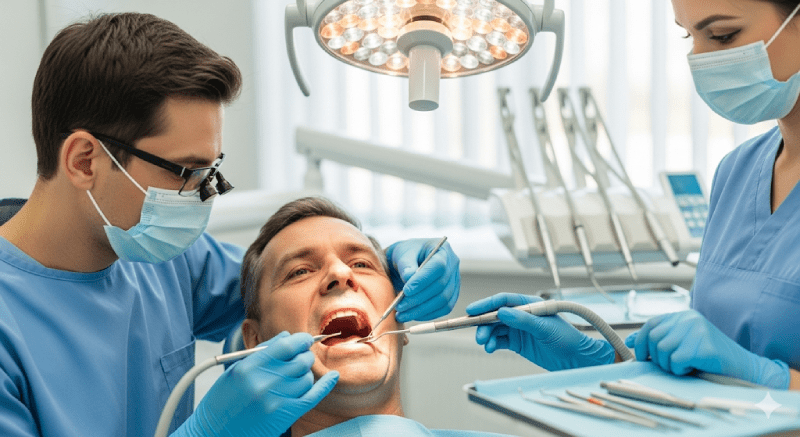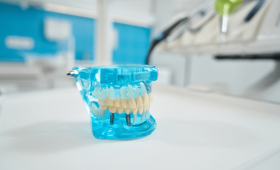What is the average cost of a dental implant in Berlin?
The average cost of a single dental implant in Berlin can vary significantly depending on the clinic’s prestige, the dentist’s experience, and the implant brand used. Generally, the treatment cost, which includes the implant, abutment, and crown, ranges from €1,800 to €4,000. This price covers the basic surgical procedure and the prosthesis. However, if additional procedures such as bone grafting or sinus lifting are required, the total cost can increase further. Central locations in Berlin usually offer higher prices.
What are the main factors affecting implant prices in Berlin?
The most important factors affecting implant prices include the brand and quality of the implant itself. Premium brands like Straumann and Nobel Biocare are more expensive due to their longevity and reliability. The dentist’s level of expertise and experience are also decisive in pricing; a surgeon specializing in implantology might charge a higher fee. Furthermore, the technology used by the clinic, the necessity of additional surgical procedures, and the patient’s overall oral health condition are other significant elements that influence the cost.
Does basic health insurance in Germany cover the cost of an implant?
Public health insurance (GKV) in Germany does not cover the full cost of dental implants. Only a basic fixed contribution is paid for the “standard treatment” of the prosthetic part, such as a crown or bridge. The implant itself is considered a “special service,” and the patient has to cover the vast majority of the costs. Those who have purchased more comprehensive private dental insurance (Zahnzusatzversicherung) may be able to reclaim a part or all of the implant costs.
How much of the implant cost do private dental insurances cover in Germany?
Private dental insurances (Zahnzusatzversicherung) in Germany can cover between 50% and 100% of the implant costs, depending on the policy’s coverage. It is important to check in advance the extent to which the insurance covers implant treatment and what the annual maximum payout limit is. Some insurances may require certain conditions, such as a specific waiting period (usually 8 months) or approval of a treatment plan, before the treatment begins.
What are the advantages of getting an implant in Berlin?
Berlin offers high-quality service standards, state-of-the-art equipment, and highly experienced dentists for dental implant treatment. Germany’s healthcare system is known for its strict hygiene and safety protocols. The treatment is carried out in compliance with European Union standards. Furthermore, there are many English-speaking dentists and clinics in Berlin, which eliminates the language barrier.

How does the dental implant treatment process work in Berlin?
The dental implant process in Berlin begins with an evaluation of the patient’s overall oral health. Digital tomography (CBCT) is used for 3D imaging and digital planning. Subsequently, a surgical procedure is performed to place the implant in the jawbone. After a waiting period of several months for healing and fusion with the bone (osseointegration), the abutment and prosthesis (crown) are attached to the implant.
What materials are used for implants in Germany?
In clinics in Germany, the most commonly used material for dental implants is titanium. Titanium is preferred because it is biocompatible and integrates easily with the jawbone. Additionally, zirconia implants are becoming increasingly popular for patients with aesthetic concerns or those with metal allergies. Zirconia is considered aesthetically superior because it is close to the color of natural teeth and allows light to pass through.
How long does dental implant treatment take?
The total duration of dental implant treatment varies depending on the patient’s condition and the necessary additional procedures. The placement of a single implant usually takes less than an hour. The main waiting period is for osseointegration, the fusion of the implant with the bone, which can range from 3 to 6 months. Additional procedures like bone grafting can extend this period. The final stage, the creation and placement of the crown, is completed within a few weeks.
Is implant treatment a painful process?
Since dental implant surgery is performed under local anesthesia, the patient does not feel any pain during the procedure. Mild pain and swelling after the surgery are normal, but this condition can usually be easily controlled with prescribed painkillers. Thanks to modern surgical techniques, postoperative discomforts are minimized.
What should be paid attention to after implant surgery?
After implant surgery, it is important to consume soft foods and avoid hot beverages for the first few days. Attention should be paid to oral hygiene, but brushing the surgical area should be avoided. Mouthwash should be used as recommended by the dentist. Smoking and alcohol consumption should be avoided as they negatively affect the healing process.
When is bone grafting necessary and what is its cost?
Bone grafting becomes mandatory when there is insufficient bone volume or density in the area where the implant will be placed. The jawbone can resorb after tooth loss, and a solid foundation is necessary for the implant to be stable. In Berlin, the cost of bone grafting can range from €500 to €2,000 depending on the size of the procedure and the material used.
What is the sinus lifting procedure and what is its cost?
Sinus lifting is a surgical procedure applied when there is insufficient bone height in the molar region of the upper jaw. To safely place the implant, the floor of the sinus is gently lifted, and bone graft material is placed. In Berlin, a sinus lifting procedure can cost between €1,000 and €3,000, depending on the complexity of the operation.
What is the success rate of implant treatment?
The success rate of dental implant treatments in Germany and Berlin is quite high, consistent with international standards, generally over 95%. Success depends on many factors, including the patient’s overall health, the dentist’s experience, the quality of the implant brand used, and the patient’s attention to oral hygiene.
What is the lifespan of implants?
With proper oral hygiene and regular dental check-ups, dental implants can last a lifetime. The implant itself (the titanium screw) usually comes with a lifetime warranty, while the crown on top may need to be replaced after 10-15 years due to wear or damage. Good maintenance directly affects the lifespan of the implant.
How to choose an implant clinic in Berlin?
When choosing an implant clinic in Berlin, it is important to check for documents that demonstrate the dentist’s expertise and experience. The technology used by the clinic, as well as patient reviews and references, can also help you make a reliable choice. Clinics that provide a transparent treatment plan and cost breakdown should be prioritized.
What is the waiting time for a dental implant in Germany?
The waiting time for an appointment for dental implant treatment in Germany is generally not very long. However, there is a healing period of 3 to 6 months for the implant to fuse with the bone. The completion of the treatment includes this healing period and can generally take several months.
Can patients from abroad get implants in Berlin?
Yes, patients from abroad can receive dental implant treatment in Berlin. Many clinics in Berlin offer special services for international patients and have English-speaking staff. However, it is important to remember that treatment costs are generally higher than in other countries, and there will be additional expenses such as travel and accommodation.
Who performs implant surgery in Berlin?
In Berlin, implant surgery is generally performed by oral surgeons or experienced dentists specializing in implantology. These specialists use the latest technological equipment to perform the treatment in the safest and most effective way.
Is a bridge or an implant better for a single missing tooth?
The choice between an implant and a bridge for a single missing tooth depends on the patient’s condition and preferences. Bridges require the reduction of adjacent teeth, which can damage healthy teeth. Implants, on the other hand, replace the missing tooth without touching the neighboring teeth, prevent jawbone loss, and offer a more natural aesthetic solution.
Can dental implants cause allergies?
The titanium material used in dental implants has a very low probability of causing an allergy due to its biocompatibility. In rare cases, some individuals may experience a mild reaction to titanium. In this case, alternative materials like zirconia can be used.
Is implant treatment suitable for smokers?
Smoking significantly reduces the success rate of dental implant treatment. Smoking decreases blood flow in the mouth, slows down the healing process, and increases the risk of infection. For this reason, dentists advise patients who smoke to quit for at least a few weeks before and after the treatment.
What is the effect of implant treatment on general health?
Dental implants restore chewing function by replacing missing teeth, which can improve digestive health. Implants also boost the patient’s self-confidence by improving aesthetic appearance and speech and have a positive effect on overall quality of life.
What additional costs may arise besides the implant price?
In addition to the basic price of the implant, extra costs may arise, such as initial examination and consultation fees, 3D tomography (CBCT) costs, costs of additional surgical procedures like bone grafting or sinus lifting, and the cost of temporary prostheses. It is important to clarify these additional costs when creating the treatment plan.
Is there a possibility of implant rejection?
The possibility of dental implants being rejected by the body is very low, thanks to the use of biocompatible materials like titanium. In rare cases, the implant may fail to fuse with the bone (osseointegration failure). This can be due to factors such as infection, insufficient bone structure, or smoking. In case of failure, the implant can be removed and replaced.
What are the aesthetic results of implant treatment?
Dental implants provide the most natural aesthetic and functional results. Porcelain or zirconia crowns placed on the implant are custom-designed to match the color and shape of the patient’s other teeth. This is aimed at ensuring the implant provides a natural and aesthetic appearance in the mouth.
Are there financing options for implant payments in Berlin?
Some dental clinics in Berlin may offer financing options to help patients make the costs more manageable. This could include installment plans that allow the payment to be spread over a certain period or agreements made with financing companies. It would be beneficial to ask whether the clinic offers such services before starting treatment.
Are dentists in Germany experienced enough?
Dentists in Germany are required to comply with the European Union’s strict education and licensing standards. Dental programs at universities are of high quality. Many dentists receive additional training to specialize in specific areas like implantology. For this reason, German dentists are considered to be highly skilled and experienced, and are expected to provide high-quality service.

Is post-implant care different from natural teeth?
Although the care for implants is similar to that for natural teeth, it involves some differences. Special implant toothbrushes or interdental brushes can be used to clean the gums around the implant. These brushes clean the spaces around the implant more effectively. Regular dental check-ups are very important for monitoring the health of the implant.
What examinations are performed before implant treatment?
Before implant treatment, a comprehensive intraoral examination is performed. The dentist assesses the jawbone structure and gum health to determine if your oral and dental health is suitable for an implant. Digital tomography (CBCT) is used for 3D imaging to determine bone density and the most suitable location for the implant.
Who are the right candidates for implant treatment?
The most suitable candidates for dental implant treatment are individuals with sufficient bone volume and healthy gums. The success rate may decrease in people with uncontrolled chronic diseases like diabetes, those who smoke, or have issues like osteoporosis. Therefore, a comprehensive examination and evaluation are essential before treatment.
What technologies are used in dental clinics in Berlin?
Modern dental clinics in Berlin use the latest technologies in implant treatment. Digital radiography (CBCT) for 3D imaging, computer-aided planning (CAD/CAM), laser technologies, and digital intraoral scanners make the treatment faster, more precise, and more comfortable. These technologies are critical for accurate diagnosis and planning.
Does implant treatment have irreversible effects?
Dental implant treatment generally does not have an irreversible effect. A failed implant can be removed and replaced. However, ignoring the precautions that should be taken before and after treatment can lead to damage to the gums and jawbone.
Is it necessary to use a temporary prosthesis after the implant?
In some cases, especially for front teeth where there are aesthetic concerns, a temporary prosthesis can be placed on the implant. This allows the patient to have an aesthetic and functional solution during the healing process. The temporary prosthesis is specially designed so that it does not put pressure on the implant.
Does a high price always mean high quality?
High prices are generally associated with high-quality service, advanced technology, and experienced dentists. However, this may not always be a correct indicator. Pricing can also be influenced by factors such as the clinic’s location and brand prestige. Therefore, it is important to focus not only on the price but also on the clinic’s references, the materials used, and the dentist’s experience.
Why do implant brands have different prices?
Implant brands have different prices depending on factors such as R&D investments, clinical tests, and production quality. Premium brands like Straumann and Nobel Biocare stand out with years of scientific research and high success rates. More affordable brands can also be of high quality, but they generally have less clinical data.
Which hospitals or clinics should be preferred for dental implants in Berlin?
In Berlin, private clinics are generally preferred for dental implant treatment. These clinics usually have the latest technology and specialized teams. Some university hospitals may also offer dental implant services, but private clinics are more common and accessible.


